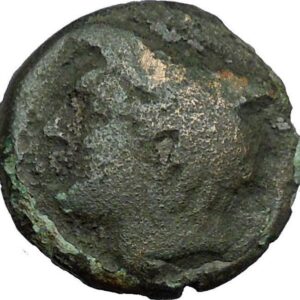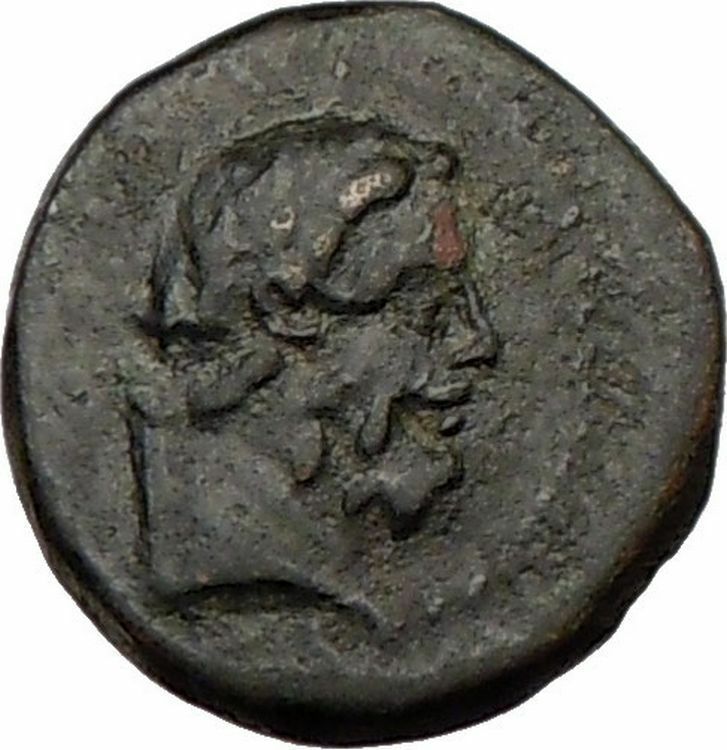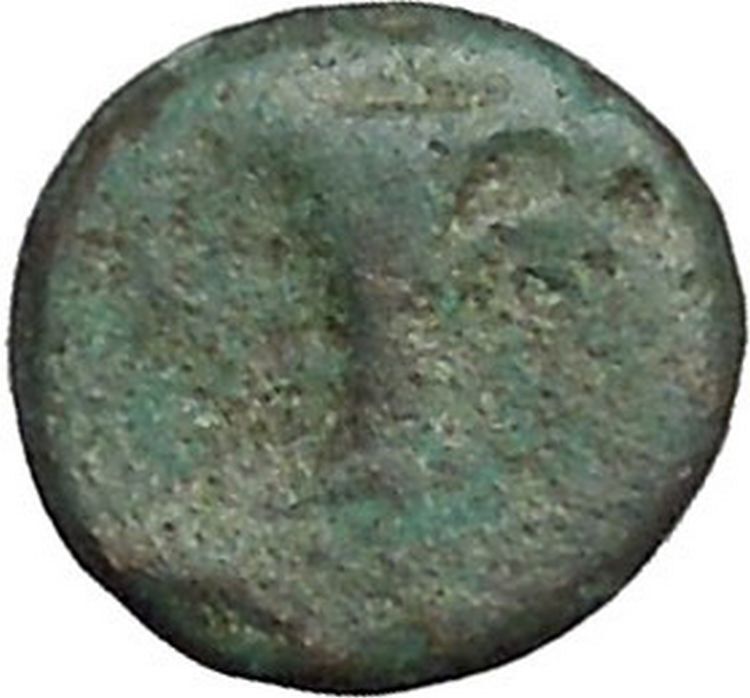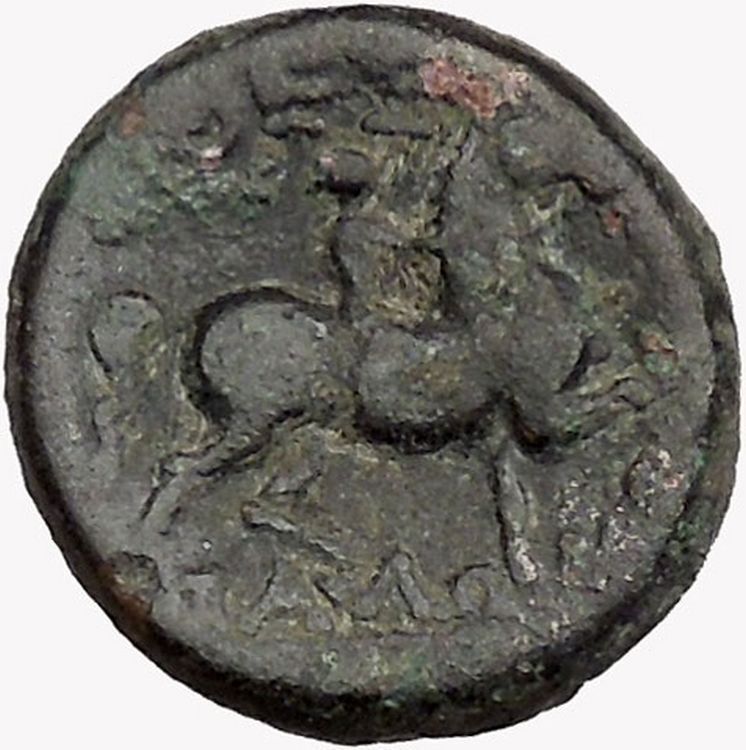|
Greek coin of the Kingdom of
Macedonia
Philip V – King: 221-179 B.C.
Bronze 20mm (2.84 grams) Struck circa 221-179 B.C.
Reference: SNGCop 1244
Diademed head of Zeus right.
Β-Α Φ, Athena Alkidemos standing right throwing a spear and holding shield.
Son of Demetrios II, Philip V
came to power in 221 B.C. on the death of Antigonos Doson. He was a vigorous
ruler and maintained the power of the Macedonian kingdom in the earlier part of
his reign. However, he made the mistake of arousing the enmity of the Romans,
and in 197 B.C. his power was crushed at the battle of the Kynoskephalai by the
Roman general T. Quinctius Flamininus. After this his power and territory were
severely curtailed by Rome, and the days of the Macedonian kingdom were
numbered.
You are bidding on the exact item pictured,
provided with a Certificate of Authenticity and Lifetime Guarantee of
Authenticity.

Athena
or Athene (Latin:
Minerva
),
also referred to as Pallas Athena, is the goddess of war, civilization,
wisdom, strength, strategy, crafts, justice and skill in
Greek mythology
.
Minerva
,
Athena’s Roman incarnation, embodies similar attributes. Athena is also a shrewd
companion of heroes
and the goddess
of heroic
endeavour. She is the
virgin
patron of Athens
.
The Athenians built the
Parthenon
on the Acropolis of her namesake city, Athens, in her honour (Athena Parthenos).
Athena’s cult as the patron of Athens seems to have existed from the earliest
times and was so persistent that archaic myths about her were recast to adapt to
cultural changes. In her role as a protector of the city (polis),
many people throughout the Greek world worshiped Athena as Athena Polias
(“Athena of the city”).
Athens
and Athena bear etymologically connected names.
In the
ancient Greek
religion, Zeus was the
“Father of Gods and men” (πατὴρ ἀνδρῶν τε θεῶν
τε)
who ruled the Olympians of
Mount Olympus
as a father ruled the family. He was the
god of sky
and
thunder
in
Greek mythology
.
His
Roman
counterpart is
Jupiter
and
Etruscan
counterpart is Tinia
.![The Jupiter de Smyrne, discovered in Smyrna in 1680[1]](https://upload.wikimedia.org/wikipedia/commons/thumb/c/c8/Jupiter_Smyrna_Louvre_Ma13.jpg/200px-Jupiter_Smyrna_Louvre_Ma13.jpg)
Zeus was the child of
Cronus
and
Rhea
,
and the youngest of his siblings. In most traditions he was married to
Hera, although, at the
oracle of Dodona
,
his consort was
Dione
:
according to the Iliad
,
he is the father of
Aphrodite
by Dione. He is known for his erotic escapades. These resulted in many godly and
heroic offspring, including
Athena
,
Apollo
and Artemis
,
Hermes
,
Persephone
(by Demeter
),
Dionysus
,
Perseus
,
Heracles
,
Helen of Troy
,
Minos
,
and the Muses
(by Mnemosyne
);
by Hera, he is usually said to have fathered
Ares,
Hebe
and Hephaestus
.
As
Walter Burkert
points out in his book, Greek Religion, “Even the gods who are not his
natural children address him as Father, and all the gods rise in his presence.”
For the Greeks, he was the
King of the Gods
,
who oversaw the universe. As
Pausanias
observed, “That Zeus is king in heaven is a saying common to all men”. In
Hesiod’s Theogony
Zeus assigns the various gods their roles. In the Homeric Hymns he is
referred to as the chieftain of the gods.
His symbols are the
thunderbolt
,
eagle
,
bull
,
and oak
.
In addition to his Indo-European inheritance, the classical “cloud-gatherer”
also derives certain iconographic traits from the cultures of the
Ancient Near East
,
such as the
scepter
.
Zeus is frequently depicted by Greek artists in one of two poses: standing,
striding forward, with a thunderbolt leveled in his raised right hand, or seated
in majesty.
Philip V (Greek:
Φίλιππος Ε΄) (238 BC – 179 BC) was King of
Macedon
from 221 BC to 179 BC. Philip’s reign
was principally marked by an unsuccessful struggle with the emerging power of
Rome
. Philip was attractive and charismatic as
a young man. A dashing and courageous warrior, he was inevitably compared to
Alexander the Great
and was nicknamed the
darling of Hellas (Greek:
η αγάπη μου για Ελλάδα).
//
Early
life
The son of
Demetrius II
and Chryseis, Philip was nine
years old at his father’s death in 229 BC. He had an elder paternal half sister
called Apame
. His cousin,
Antigonus Doson
, administered the kingdom as
regent until his death in 221 BC when Philip was seventeen years old.
On his ascent to the throne, Philip quickly showed that while he was young,
this did not mean that Macedon was weak. In the first year of his rule, he
pushed back the Dardani
and other tribes in the north of the
country.
The
Social War
In the Social War (220
BC–217
BC), the Hellenic League of Greek states was assembled at Philip V’s
instigation in Corinth
. He then led the Hellenic League in
battles against Aetolia
,
Sparta
and
Elis. At the same time he was able to stamp on his own authority
amongst his own ministers. His leadership during the Social War made him
well-known and respected both within his own kingdom and abroad.
First
Macedonian War
After the Peace of Naupactus in 217 BC, Philip V tried to replace
Roman
influence along the eastern shore of the
Adriatic
, forming alliances or lending
patronage to certain island and coastal provinces such as
Lato on Crete. He first tried to invade
Illyria
from the sea, but with limited success.
His first expedition in 216 BC had to be aborted, while he suffered the loss of
his whole fleet in a second expedition in 214 BC. A later expedition by land met
with greater success when he captured
Lissus
in 212 BC.
In 215 BC he entered into a treaty with
Hannibal
, the
Carthaginian
general then in the middle of an
invasion of Roman Italy. Their treaty defined spheres of operation and interest,
but achieve little of substance or value for either side. Philip became heavily
involved in assisting and protecting his allies from attacks from the
Spartans
, the Romans and their allies.
Rome’s alliance with the
Aetolian League
in 211 BC effectively
neutralised Philip’s advantage on land. The intervention of
Attalus I of Pergamum
on the Roman side further
exposed Philip’s position in Macedonia.
Philip was able to take advantage of the withdrawal of Attalus from the Greek
mainland in 207 BC, along with Roman inactivity and the increasing role of
Philopoemen
, the
strategos
of the
Achaean League
. After sacking Thermum, the
religious and political centre of
Aetolia
, Philip was able to force the Aetolians
to accept his terms in 206 BC. The following year he was able to conclude the
Peace of Phoenice
with Rome and its allies.
Expansion
in the Aegean
Following an agreement with the
Seleucid
king
Antiochus III
to capture Egyptian held
territory from the boy king
Ptolemy V
, Philip was able to gain control of
Egyptian territory in the
Aegean Sea
and in
Anatolia
. This expansion of Macedonian
influence created alarm in a number of neighbouring states, including
Pergamum
and
Rhodes
. Their navies clashed with Philip’s off
Chios
and
Lade (near
Miletus
) in 201 BC. At around the same time,
the Romans were finally the victorious over Carthage.
Second
Macedonian War
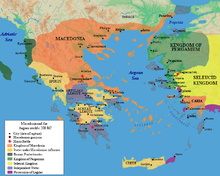
Kingdom of Macedon on the eve of the Second Macedonian War, circa
200 BC.
In 200 BC, with Carthage no longer a threat, the Romans declared war on
Macedon arguing that they were intervening to protect the freedom of the Greeks.
After campaigns in
Macedonia
in 199 BC and
Thessaly
in 198 BC, Philip and his Macedonian
forces were decisively defeated at the
Battle of Cynoscephalae
in 197 BC. The war also
proved the superiority of the
Roman legion
over the Greek
phalanx formation
.
Alliance
with Rome
The resulting peace treaty between Philip V and the Romans confined Philip to
Macedonia and required him to pay 1000
talents
indemnity
, surrender most of its fleet and
provide a number of hostages, including his younger son Demetrius. After this,
Philip cooperated with the Romans and sent help to them in their fight against
the Spartans under King
Nabis
in 195 BC. Philip also supported the
Romans against Antiochus III (192 BC-189 BC).
In return for his help when Roman forces under
Publius Cornelius Scipio Africanus
and his
brother
Lucius Cornelius Scipio Asiaticus
moved through
Macedon and Thrace
in 190 BC, the Romans forgave the
remaining indemnity that he had to pay and his son Demetrius was freed. Philip
then focused on consolidating power within Macedon. He reorganised the country’s
internal affairs and finances, mines were reopened and a new currency was
issued.
Final
years
However, Rome continued to be suspicious of Philip’s intentions. Accusations
by Macedon’s neighboring states, particularly
Pergamum
, led to constant interference from
Rome. Feeling the threat growing that Rome would invade Macedon and remove him
as king, he tried to extend his influence in the
Balkans
by force and diplomacy. However, his
efforts were undermined by the pro-Roman policy of his younger son Demetrius,
who was encouraged by Rome to consider the possibility of succession ahead of
his older brother,
Perseus
. This eventually led to a quarrel
between Perseus and Demetrius which forced Philip to reluctantly decide to
execute Demetrius for treason in 180 BC. This decision had a severe impact on
Philip’s health and he died a year later at
Amphipolis
.
He was succeeded by his eldest son
Perseus
, who ruled as the last king of
Macedon
.
Macedonia or Macedon (from
Greek
: Μακεδονία,
Makedonía) was an
ancient kingdom
, centered in the northeastern part of
the
Greek peninsula
,
bordered by
Epirus
to the west,
Paionia
to the north, the region of
Thrace
to the east and
Thessaly
to the south. For a brief period,
after the conquests of
Alexander the Great
, it became the most
powerful state in the world, controlling a territory that included most of
Greece
and
Persia
, stretching as far as the
Indus River
; at that time it inaugurated the
Hellenistic period
of
history
.
Name
The name Macedonia (Greek:
Μακεδονία,
Makedonía) is related to
the ancient Greek word μακεδνός (Makednos).
It is commonly explained as having originally meant ‘a tall one’ or
‘highlander’, possibly descriptive of the
people
. The shorter English name variant
Macedon developed in Middle English, based on a borrowing from the French
form of the name, Macédoine.
History
Early history and
legend
The lands around Aegae, the first Macedonian capital, were home to various
peoples. Macedonia was called Emathia (from king Emathion) and the city of Aiges
was called Edessa, the capital of fabled king Midas. According to legend,
Caranus, accompanied by a multitude of Greeks came to the area in search for a
new homeland
[5]
took Edessa and renamed it to Aegae.
Subsequently, he expelled Midas and other kings off the lands and he formed his
new kingdom. According to Herodot, it was Dorus, the son of Hellen who led his
people to Histaeotis, whence they were driven off by the Cadmeians into Pindus,
where they settled as Macedonians. Later, a branch would migrate further south
to be called Dorians
[6]
.
It seems that the first
Macedonian
state emerged in the
8th
or early
7th century BC
under the
Argead Dynasty
, who, according to legend,
migrated to the region from the
Greek city
of
Argos
in Peloponnesus (thus the name Argead).[7]
It should be mentioned that the Macedonian tribe ruled by the Argeads, was
itself called Argead (which translates as “descended from Argos”).
The kingdom was situated in the fertile alluvial plain, watered by the rivers
Haliacmon
and
Axius
, called Lower Macedonia, north of
the mountain
Olympus
. Around the time of
Alexander I of Macedon
, the Argead Macedonians
started to expand into
Upper Macedonia
, lands inhabited by independent
Macedonian tribes like the Lyncestae and the Elmiotae and to the West, beyond
Axius river, into
Eordaia
,
Bottiaea
,
Mygdonia
, and
Almopia
-, regions settled by, among others,
many Thracian tribes.[8]
Near the modern city of
Veria
,
Perdiccas I
(or, more likely, his son,
Argaeus I
) built his capital, Aigai (modern
Vergina
). After a brief period under
Persian
rule under
Darius Hystaspes
, the state regained its
independence under King
Alexander II
(495–450
BC).

Macedon during the
Peloponnesian Warr
around 431 BC.
In the long
Peloponnesian War
Macedon was a secondary power
that alternated in support between Sparta and Athens.
Involvement in
the Greek world
Prior to the
4th century BC
, the kingdom covered a region
approximately corresponding to the
province of Macedonia
of modern
Greece Amyntas III
(c.
393
–370
BC), though it still retained strong contrasts between the
cattle-rich coastal plain and the fierce isolated tribal hinterland, allied to
the king by marriage ties. They controlled the passes through which barbarian
invasions came from
Illyria
to the north and northwest. It became
increasingly
Atticised
during this period, though prominent
Athenians
appear to have regarded the
Macedonians as uncouth.[10]
Before the establishment of the
League of Corinth
, even though the Macedonians
apparently spoke a dialect of the Greek language and claimed proudly that they
were Greeks, they were not considered to fully share the
classical Greek
culture by many of the
inhabitants of the southern city states, because they did not share the
polis
based style of government of the
southerners.[9]
Herodotus
, being one of the foremost biographer
in antiquity who lived in Greece at the time when the Macedonian king
Alexander I
was in power, mentioned: “I
happen to know, and I will demonstrate in a subsequent chapter of this history,
that these descendants of Perdiccas are, as they themselves claim, of Greek
nationality. This was, moreover, recognized by the managers of the
Olympic games
, on the occasion when
Alexander
wished to compete and his Greek
competitors tried to exclude him on the ground that foreigners were not allowed
to take part. Alexander, however, proved his Argive descent, and so was accepted
as a Greek and allowed to enter for the foot-race. He came in equal first”..[11]
Over the 4th century Macedon became more politically involved with the
south-central city-states of
Ancient GreecePella
, resembling
Mycenaean
culture more than classic
Hellenic
city-states, and other archaic
customs, like Philip’s multiple wives in addition to his Epirote queen
Olympias
, mother of Alexander.
Another archaic remnant was the very persistence of a
hereditary
monarchy
which wielded formidable – sometimes
absolute – power, although this was at times checked by the landed aristocracy,
and often disturbed by power struggles within the royal family itself. This
contrasted sharply with the Greek cultures further south, where the ubiquitous
city-states mostly possessed aristocratic or democratic institutions; the
de facto
monarchy of
tyrants
, in which heredity was usually more of
an ambition rather than the accepted rule; and the limited, predominantly
military and sacerdotal, power of the twin hereditary
Spartan
kings. The same might have held true of
feudal
institutions like
serfdom
, which may have persisted in Macedon
well into historical times. Such institutions were abolished by city-states well
before Macedon’s rise (most notably by the Athenian legislator
Solon
‘s famous
σεισάχθεια
seisachtheia
laws)..
Amyntas had three sons; the first two,
Alexander II
and
Perdiccas III
reigned only briefly. Perdiccas
III’s infant heir was deposed by Amyntas’ third son,
Philip II of Macedon
, who made himself king and
ushered in a period of Macedonian dominance of Greece. Under Philip II, (359–336
BC), Macedon expanded into the territory of the
Paionians
,
Thracians
, and
Illyrians
. Among other conquests, he annexed
the regions of
Pelagonia
and Southern
Paionia
.[12]]

Kingdom of Macedon after Philip’s II death.
Philip redesigned the
army of Macedon
adding a number of variations
to the traditional
hoplite
hetairoi
, a well armoured heavy cavalry, and
more light infantry, both of which added greater flexibility and responsiveness
to the force. He also lengthened the spear and shrank the shield of the main
infantry force, increasing its offensive capabilities.
Philip began to rapidly expand the borders of his kingdom. He first
campaigned in the north against non-Greek peoples such as the
IllyriansAmphipolis
, which controlled the way
into Thracee
and also was near valuable silver
mines. This region had been part of the
Athenian Empire
, and Athens still considered it
as in their sphere. The Athenians attempted to curb the growing power of
Macedonia, but were limited by the outbreak of the
Social War
. They could also do little to halt
Philip when he turned his armies south and took over most of
Thessaly
.
Control of Thessaly meant Philip was now closely involved in the politics of
central Greece. 356 BCE saw the outbreak of the
Third Sacred War
that pitted
Phocis
against
Thebes
and its allies. Thebes recruited the
Macedonians to join them and at the
Battle of Crocus Field
Phillip decisively
defeated Phocis and its Athenian allies. As a result Macedonia became the
leading state in the
Amphictyonic League
and Phillip became head of
the Pythian Games, firmly putting the Macedonian leader at the centre of the
Greek political world.
In the continuing conflict with Athens Philip marched east through Thrace in
an attempt to capture
Byzantium
and the
Bosphorus
, thus cutting off the Black Sea grain
supply that provided Athens with much of its food. The siege of Byzantium
failed, but Athens realized the grave danger the rise of Macedon presented and
under Demosthenes
built a coalition of many of the
major states to oppose the Macedonians. Most importantly Thebes, which had the
strongest ground force of any of the city states, joined the effort. The allies
met the Macedonians at the
Battle of Chaeronea
and were decisively
defeated, leaving Philip and the Macedonians the unquestioned master of Greece.
Empire
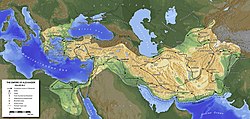
Alexander’s empire at the time of its maximum expansion
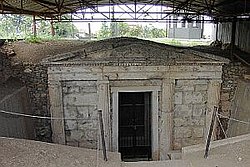
The entrance to one of the royal tombs at Vergina, a UNESCO World
Heritage site.
Philip’s son,
Alexander the Great
(356–323
BC), managed to briefly extend Macedonian power not only over the
central Greek city-states, but also to the
Persian empire
, including
Egypt
and lands as far east as the fringes of
India
. Alexander’s adoption of the styles of
government of the conquered territories was accompanied by the spread of Greek
culture and learning through his vast empire. Although the empire fractured into
multiple Hellenic regimes shortly after his death, his conquests left a lasting
legacy, not least in the new Greek-speaking cities founded across Persia’s
western territories, heralding the
Hellenistic
Diadochi, Macedonia fell to the
Antipatrid dynasty
, which was overthrown by the
Antigonid dynasty
after only a few years, in
294 BC..
Hellenistic era
Antipater
and his son
Cassander
gained control of Macedonia but it
slid into a long period of civil strife following Cassander’s death in
297 BC
. It was ruled for a while by
Demetrius I
(294–288
BC) but fell into civil war.
Demetrius’ son,
Antigonus II
(277–239
BC), defeated a
Galatian
invasion as a
condottiere
, and regained his family’s
position in Macedonia; he successfully restored order and prosperity there,
though he lost control of many of the Greek city-states. He established a stable
monarchy under the
Antigonid dynasty
.
Antigonus III
((239–221
BC) built on these gains by re-establishing Macedonian power across
the region.
What is notable about the Macedonian regime during the Hellenistic times is
that it was the only successor state to the Empire that maintained the old
archaic perception of Kingship, and never adopted the ways of the Hellenistic
Monarchy. Thus the king was never deified in the same way that Ptolemies and
Seleucids were in Egypt and Asia respectively, and never adopted the custom of
Proskynesis
. The ancient Macedonians during the
Hellenistic times were still addressing their kings in a far more casual way
than the subjects of the rest of the Diadochi, and the Kings were still
consulting with their aristocracy (Philoi) in the process of making their
decisions.
Conflict with Rome

Kingdom of Macedon under Philip V.
Under
Philip V of Macedon
(221–179
BC Perseus of Macedon (179–168
BC), the kingdom clashed with the rising power of the
Roman Republic
. During the
2nd
and
1st centuries BC
, Macedon fought a
series of wars
with Rome. Two major losses that
led to their inevitable defeat were in
197 BC
when Rome defeated Philip V, and
168 BC
when Rome defeated Perseus. The overall
losses resulted in the defeat of Macedon, the deposition of the Antigonid
dynasty and the dismantling of the Macedonian kingdom.
Andriscus
‘ brief success at reestablishing the
monarchy in 149 BCC
was quickly followed by his defeat the
following year and the establishment of direct
Roman
rule and the organization of Macedon as
the
Roman province of Macedonia
.
Institutions
éthnē), and between the two, the districts. The study of these different
institutions has been considerably renewed thanks to
epigraphy
, which has given us the possibility
to reread the indications given us by ancient literary sources such as
Livy and
Polybius
. They show that the Macedonian
institutions were near to those of the Greek federal states, like the
Aetolian
and
Achaeann
leagues, whose unity was reinforced by
the presence of the king.

The
Vergina Sun
, the 16-ray star covering
what appears to be the royal burial larnax of Philip II of Macedon,
discovered in Vergina, Greece.
The King
The king
Βασιλεύς,
Basileús) headed the
central administration: he led the kingdom from its capital, Pella, and in his
royal palace was conserved the state’s archive. He was helped in carrying out
his work by the Royal Secretary (βασιλικὸς
γραμματεύς, basilikós
grammateús), whose work was of primary importance, and by the
Council
.
The king was commander of the army, head of the Macedonian religion, and
director of diplomacy. Also, only he could conclude treaties, and, until
Philip V
, mint coins.
The number of civil servants was limited: the king directed his kingdom
mostly in an indirect way, supporting himself principally through the local
magistrates, the epistates, with whom he constantly kept in touch.
Successionon
Royal succession in Macedon was hereditary, male,
patrilineal
and generally respected the
principle of
primogeniture
. There was also an elective
element: when the king died, his designated heir, generally but not always the
eldest son, had first to be accepted by the council and then presented to the
general Assembly to be acclaimed king and obtain the oath of fidelity.
Perdiccas III, slain by the
Illyrians
,
Philip II
assassinated by
Pausanias of Orestis
,
Alexander the Great
, suddenly died of malady,
etc. Succession crises were frequent, especially up to the
4th century BC
, when the magnate families of
Upper Macedonia still cultivated the ambition of overthrowing the Argaead
dynasty and to ascend to the throne.
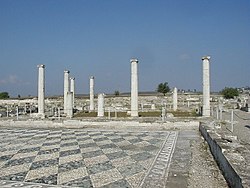
An atrium with a pebble-mosaic paving, in Pella, Greece
Financesces
The king was the simple guardian and administrator of the treasure of Macedon
and of the king’s incomes (βασιλικά,
basiliká), which belonged
to the Macedonians: and the tributes that came to the kingdom thanks to the
treaties with the defeated people also went to the Macedonian people, and not to
the king. Even if the king was not accountable for his management of the
kingdom’s entries, he may have felt responsible to defend his administration on
certain occasions: Arrian
tells us that during the
mutiny
of Alexander’s soldiers at
Opis in 324 BC BC
, Alexander detailed the possessions
of his father at his death to prove he had not abused his charge.
It is known from Livy and Polybius that the basiliká included the
following sources of income:
- The mines of gold and silver (for example those of the
Pangaeus
), which were the exclusive
possession of the king, and which permitted him to strike currency, as
already said his sole privilege till Philip V, who conceded to cities and
districts the right of coinage for the lesser denominations, like bronze.
- The forests, whose timber was very appreciated by the Greek
cities to build their ships: in particular, it is known that
Athens
made commercial treaties with
Macedon in the
5th century BC
to import the timber
necessary for the construction and the maintenance of its fleet of war.
- The royal landed properties, lands that were annexed to the royal
domain through conquest, and that the king exploited either directly, in
particular through servile workforce made up of prisoners of war, or
indirectly through a leasing system.
- The port duties on commerce (importation and exportation taxes).
The most common way to exploit these different sources of income was by
leasing: the Pseudo-Aristotle
reports in the
Oeconomica
that
Amyntas III
(or maybe Philip II) doubled the
kingdom’s port revenues with the help of
Callistratus
, who had taken refuge in Macedon,
bringing them from 20 to 40
talents
per year. To do this, the exploitation
of the harbour taxes was given every year at the private offering the highest
bidding. It is also known from Livy that the mines and the forests were leased
for a fixed sum under Philip V, and it appears that the same happened under the
Argaead dynasty: from here possibly comes the leasing system that was used in
Ptolemaic Egypt
.
Except for the king’s properties, land in Macedon was free: Macedonians were
free men and did not pay land taxes on private grounds. Even extraordinary taxes
like those paid by the Athenians in times of war did not exist. Even in
conditions of economic peril, like what happened to Alexander in
334 BC< and Perseus in
168 BC
, the monarchy did not tax its subjects
but raised funds through loans, first of all by his Companions, or raised the
cost of the leases.
The king could grant the atelíē (ἀτελίη),
a privilege of tax exemption, as Alexander did with those Macedonian families
which had losses in the
battle of the Granicus
in May
334334
: they were exempted from paying tribute
for leasing royal grounds and commercial taxes.
Extraordinary incomes came from the spoils of war, which were divided between
the king and his men. At the time of Philip II and Alexander, this was a
considerable source of income. A considerable part of the gold and silver
objects taken at the time of the European and Asian campaigns were melted in
ingots and then sent to the monetary foundries of
Pella
Amphipolis, most active of the kingdom at
that time: an estimate judges that during the reign of Alexander only the mint
of Amphipolis struck about 13 million silver
tetradrachms
.
The Assembly
All the kingdom’s citizen-soldiers gather in a popular assembly, which is
held at least twice a year, in spring and in autumn, with the opening and the
closing of the campaigning season.
This assembly (koinê ekklesia
or koinon makedonôn), of
the army in times of war, of the people in times of peace, is called by the king
and plays a significant role through the acclamation of the kings and in capital
trials; it can be consulted (without obligation) for the foreign politics
(declarations of war, treaties) and for the appointment of high state officials.
In the majority of these occasions, the Assembly does nothing but ratify the
proposals of a smaller body, the Council. It is also the Assembly which votes
the honors, sends embassies, during its two annual meetings. It was abolished by
the Romans
at the time of their reorganization of
Macedonia in 167 BC
, to prevent, according to
Livy, that a demagogue could make use of it as a mean to revolt
against their authority.
<span class="mw-headline" id="Council_.28Synedrion.29Council (Synedrion)
The Council was a small group formed among some of the most eminent
Macedonians, chosen by the king to assist him in the government of the kingdom.
As such it was not a representative assembly, but notwithstanding that on
certain occasions it could be expanded with the admission of representatives of
the cities and of the civic corps of the kingdom.
The members of the Council (synedroi) belong to three categories:
|






![The Jupiter de Smyrne, discovered in Smyrna in 1680[1]](https://upload.wikimedia.org/wikipedia/commons/thumb/c/c8/Jupiter_Smyrna_Louvre_Ma13.jpg/200px-Jupiter_Smyrna_Louvre_Ma13.jpg)








